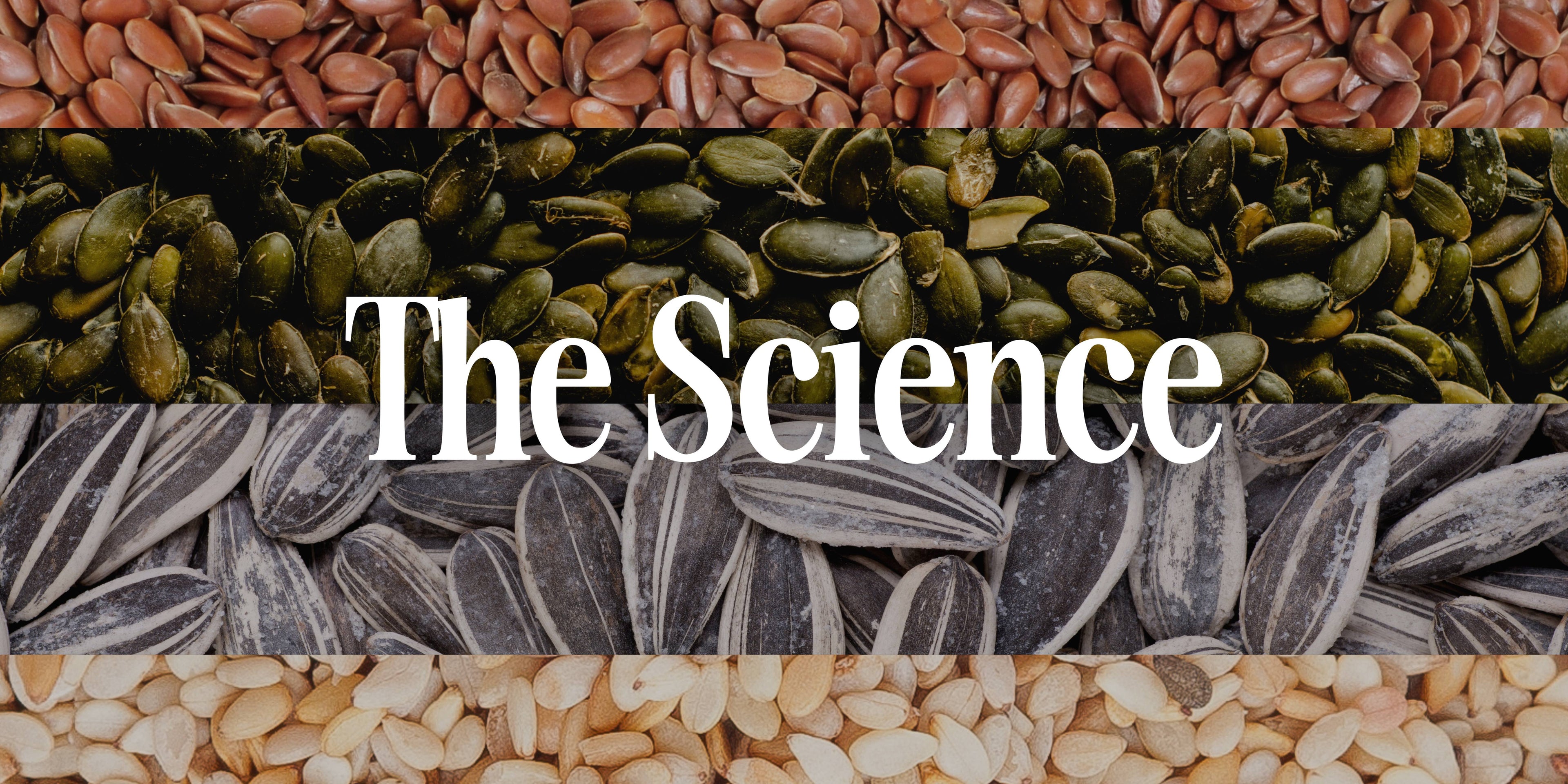
This page provides an overview of several scientific studies on seed cycling and the individual seeds. For a more basic explanation of how seed cycling works, you can read the How It Works page first.
Why We Care About the Science
At Ovy, we believe in natural, effective solutions — and we believe they should be backed by real evidence. While seed cycling has long been practiced in holistic and naturopathic spaces, emerging research is starting to validate what women have known and been saying for years: seed cycling is a powerful tool for hormonal support.
And there’s a reason why its only starting to emerge now… Unfortunately, women's health has historically been understudied — especially when it comes to menstrual cycles and natural treatments. A moritfying fact: there have been more studies on male baldness than endometriosis (a very painful condition affecting 1 in 10 women).
Even though scientific studies on women 's health aren’t abundant, that doesn’t mean they’re non existent! On this page, we will share with you the growing body of evidence that supports the practice of seed cycling and the hormone-supportive nutrients found in flax, pumpkin, sesame, and sunflower seeds.
Clinical Research on Seed Cycling
Peer Reviewed Systematic Review of Seed Cycling As Treatment for PCOS and PMS - (Nagarajan et al, 2025)
A systematic review looking at studies that were conducted on seed cycling from 2015-2025 to determine the efficacy of seed cycling as a treatment for PCOS and PMS.
"This systematic review suggests that seed cycling could be a positive complementary approach for managing the symptoms of PCOS and PMS. Improvements in lipid metabolism, insulin resistance, menstrual regularity, and hormonal profiles (including FSH, LH, and prolactin) were noted in the included studies, especially in PCOS patients. In addition, seed cycling contributed to overall symptom relief by alleviating dysmenorrhea and reducing PMS-related discomfort."
Read the full study here.
Seed Cycling for PCOS - (Kazemi et al., 2023)
Study 1: Effectiveness of combined seeds (pumpkin, sunflower, sesame, flaxseed): As adjacent therapy to treat polycystic ovary syndrome in females
A 12-week randomized clinical trial compared the effects of seed cycling and metformin in women with PCOS. Participants were divided into three groups: one followed a portion-controlled diet alone, another added metformin (500 mg/day), and the third followed the same diet but incorporated a daily seed cycling protocol using flax, pumpkin, sesame, and sunflower seeds.
The group practicing seed cycling showed the most significant improvements in hormone levels. FSH dropped from 6.55 to 3.51 mIU/mL and LH from 11.02 to 6.22 IU/L — both more substantial decreases than those seen in the metformin group. They also saw improvements in testosterone, prolactin, and TSH levels, along with more regular menstrual cycles.
These results suggest seed cycling may be a powerful, food-based tool for supporting hormone balance in PCOS.
Read the full study here.
Seed Cycling for PCOS - (Kour et al., 2024)
Study 2: Evaluation of Effect of Seed Cycling on Anthropometric, Biochemical, Hormonal and Nutritional Parameters in the Women Diagnosed with Polycystic Ovarian Syndrome -A Cohort Interventional Study Design
A second 12-week interventional study with 290 women compared the effects of seed cycling versus metformin, alongside a structured diet. The seed cycling group incorporated specific seeds during each phase of their cycle (flax and pumpkin in the follicular phase, sesame and sunflower in the luteal phase), while the other group took metformin daily.
By the end of the study, the seed cycling group experienced greater improvements across nearly every category — including hormone levels (LH, FSH, testosterone, prolactin, TSH), weight, BMI, and blood sugar. They also reported better dietary quality and more regular menstrual cycles.
These findings reinforce the potential of seed cycling as a safe, nutrition-based strategy for managing PCOS symptoms.
Read the full study here.
Seed Cycling for Fertility - (Dhamija et al., 2025)
Study: Seed Cycling and Hormonal Balance: A Case Study of Successful Fertility Intervention in Polycystic Ovarian Syndrome
A 29-year-old woman with PCOS who was struggling with infertility started a program that included seed cycling, along with myo-inositol and folic acid. Over six months:
- Her menstrual cycles became regular.
- She lost weight, with her BMI dropping from 29 (overweight) to 24 (healthy range).
- Her hormone levels returned to normal.
- She was able to successfully conceive.
Read the full study here.
Seed Cycling for PMS & Menstrual Cramps - (Citrus Labs, 2023)
In a 3-month clinical trial, 40 menstruating individuals using a seed cycling protocol experienced significant relief from PMS symptoms, cramps, acne, fatigue, digestive upset, and breast tenderness.
- 75% had less severe PMS
- 80% had less menstrual pain
- 80% had reduced breast tenderness
Read the full study here.
Nutritional Science Behind the Seeds
Flaxseeds
- Rich in lignans that support estrogen metabolism
- Contain omega-3 ALA and fiber to reduce inflammation and support gut health
- Linked to improved menstrual regularity and estrogen detox
Pumpkin Seeds
- High in magnesium and zinc — crucial for ovulation, hormone synthesis, and PMS relief
- Also contain antioxidants and healthy fats that support inflammation regulation
Read Study
Sesame Seeds
- Provide calcium, lignans, and iron
- Support estrogen detoxification and antioxidant status
- Shown to positively impact hormonal markers in postmenopausal women
Read Study
Sunflower Seeds
- Rich in selenium, vitamin E, and B6 — all linked to progesterone production and mood regulation
- Offer antioxidant protection and help reduce inflammatory symptoms during the luteal phase
Read Study
The Scientific Explanation Behind How Seed Cycling Works In The Body
Seed cycling supports hormonal balance through several well-established mechanisms:
1. Estrogen Detoxification
Lignans in flax and sesame support the liver's ability to break down and clear excess estrogen, reducing symptoms like bloating, irritability, and acne.
2. Progesterone Production
Zinc, B6, selenium, and vitamin E (especially in pumpkin and sunflower seeds) provide the nutrients your body needs to make progesterone — key for calming PMS and supporting fertility.
3. Inflammation Reduction
Omega-3s, magnesium, and vitamin E help reduce systemic inflammation, which can contribute to period pain, mood swings, and hormonal acne.
4. Blood Sugar Balance
The fiber and healthy fats in seeds help stabilize blood sugar — and balanced blood sugar is crucial for healthy hormone function.
5. Gut Health & The Estrobolome
Seed fiber feeds good gut bacteria, supporting the estrobolome — the collection of microbes that help metabolize and eliminate estrogen properly.
What Experts Say...

"Seed cycling is a simple and convenient approach to supporting hormonal balance by leveraging specific nutrients in seeds to influence estrogen and progesterone levels throughout the menstrual cycle.
Flaxseeds and pumpkin seeds, rich in lignans and zinc, can promote healthy estrogen metabolism during the follicular phase, while sesame and sunflower seeds, high in selenium and vitamin E, support progesterone production during the luteal phase.
It is an easy method to incorporate into your daily routine and provides targeted support for hormonal health in a practical and natural way."
— Dr. Marlee Guy, N.D.
How To Start Seed Cycling
- Start taking Phase 1 (ground pumpkin & flax) on the first day of your period (or the new moon if your cycle is irregular)
- Switch to Phase 2 (ground sesame and sunflower seeds) after ovulation (~Day 15)
- Repeat the process, starting Phase 1 again after you finish Phase 2
We make it easy to get started with pre-ground, perfectly portioned bites and blends for each phase.
Learn More
To continue learning how seed cycling works, you can read How It Works.
References
Kazemi, M., Shahinfar, H., & Bateni, P. (2023). Seed cycling as an adjunct therapy to treat polycystic ovary syndrome in females: a 12-week randomized trial. Food Science & Nutrition, 11(2), 349. PMC10261760.
Harpreet Kour, et al. (2024). Evaluation of Effect of Seed Cycling on Anthropometric, Biochemical, Hormonal and Nutritional Parameters in Women Diagnosed with Polycystic Ovarian Syndrome – A Cohort Interventional Study Design. Journal of Natural Remedies. DOI:10.18311/jnr/2024/36489.
Beeya Wellness / Citruslabs. (2023). Seed cycling for PMS & menstrual cramps: 3-month clinical study, n=40. 75% PMS relief, 80% menstrual pain reduction, 80% breast tenderness reduction.
Mirmiran, P., et al. (2002). Effect of flaxseed meal on menopausal symptoms: A randomized controlled trial. Journal of Medicinal Food, 7(3), 363–368. PMID: 22925074.
Nikooei, A., Houshyar, Z., & Jabehdar, M. (2006). Effect of sesame seed powder on lipid and antioxidant levels in postmenopausal women: A five‑week randomized trial. Menopause, 13(6), 892–896. PMID: 16614415.
Couto, P., et al. (2001). Effect of ground flaxseed supplementation on menstrual cycle pattern and hormone levels in premenopausal women: a pilot study. Journal of Clinical Endocrinology & Metabolism, 77(5), 1215–1219. PMID: 8077314.
Cunnane, S. C., et al. (2000). Flaxseed and estrogen metabolite balance: Effects in postmenopausal women. Cancer Epidemiology, Biomarkers & Prevention, 9(11), 1153–1157. PMID: 14749240.
Silver, R. B., et al. (2020). Flaxseed supplementation in women with PCOS: Effects on insulin resistance and inflammatory markers. International Journal of Reproductive Medicine, 2020, 31980022. PMID: 31980022.
de Souza, R. J., et al. (2015). Intake of omega-3 and omega-6 fatty acids and the risk of endometriosis: A systematic review and meta-analysis. Journal of Nutritional Biochemistry, 26(10), 1010–1021.
Vins, B. R., et al. (2013). The estrobolome and its role in estrogen metabolism. Molecular Nutrition & Food Research, 57(2), 267–276.
Thompson, L. U., Robb, P., Serraino, M., & Cheung, F. (1991). Mammalian lignan production from various foods. Nutrition and Cancer, 16(1), 43–52.
Prasad, A. S. (2008). Zinc in human health. Molecular Medicine, 14(5–6), 353–357.
Rayman, M. P. (2000). Selenium and human health. The Lancet, 356(9225), 233–241.
Belay, A., & Hagos, E. (2022). B vitamin intake and PMS risk. The American Journal of Clinical Nutrition, 100(2), 626–633.
MDPI. (2022). Phytosterols and their modulation of estrogenic activity. Journal of Functional Foods, 92, 105024.
For those who wonder "Is Seed Cycling Backed By Science?" Explore the science behind seed cycling. Backed by clinical trials and hormone research, see how nutrient-rich seeds support estrogen and progesterone balance, relieve PMS, and improve symptoms of PCOS.